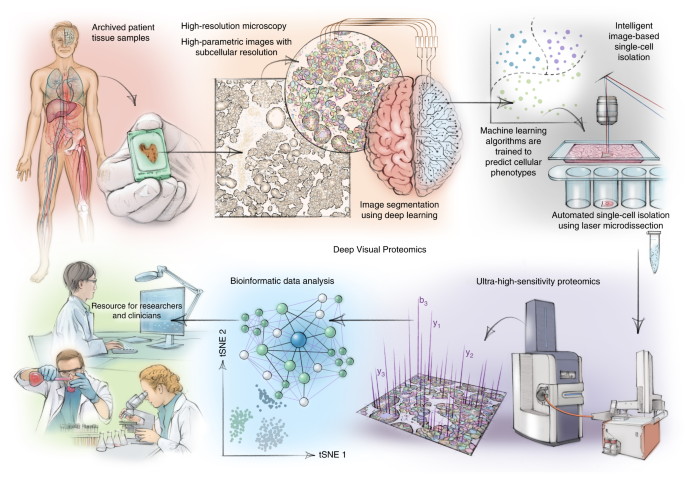“Deep Visual Proteomics “技術により細胞特異的なタンパク質情報を提供、がん疾患の解析に貢献 “Deep Visual Proteomics” technology provides cell-specific, protein-based information and helps to analyze cancer diseases
2022-05-19 マックス・プランク研究所
Matthias Mannが率いるドイツとデンマークのチームは、「Deep Visual Proteomics」と呼ばれる画期的な技術を開発しました。この方法は、研究者や臨床医に、単一細胞型の分解能でがんを理解するためのタンパク質の読み出しを提供するものです。この技術は、がん細胞への最初の応用で、その可能性を実証しています。
<関連情報>
- https://www.mpg.de/18686193/0519-bioc-20220519-schweizer-mann-153945-x?c=2249
- https://www.nature.com/articles/s41587-022-01302-5
ディープビジュアルプロテオミクスによる単一細胞の識別と異質性の特定 Deep Visual Proteomics defines single-cell identity and heterogeneity
Andreas Mund,Fabian Coscia,András Kriston,Réka Hollandi,Ferenc Kovács,Andreas-David Brunner,Ede Migh,Lisa Schweizer,Alberto Santos,Michael Bzorek,Soraya Naimy,Lise Mette Rahbek-Gjerdrum,Beatrice Dyring-Andersen,Jutta Bulkescher,Claudia Lukas,Mark Adam Eckert,Ernst Lengyel,Christian Gnann,Emma Lundberg,Peter Horvath & Matthias Mann
Nature Biotechnology Published:19 May 2022
DOI:https://doi.org/10.1038/s41587-022-01302-5

Abstract
Despite the availabilty of imaging-based and mass-spectrometry-based methods for spatial proteomics, a key challenge remains connecting images with single-cell-resolution protein abundance measurements. Here, we introduce Deep Visual Proteomics (DVP), which combines artificial-intelligence-driven image analysis of cellular phenotypes with automated single-cell or single-nucleus laser microdissection and ultra-high-sensitivity mass spectrometry. DVP links protein abundance to complex cellular or subcellular phenotypes while preserving spatial context. By individually excising nuclei from cell culture, we classified distinct cell states with proteomic profiles defined by known and uncharacterized proteins. In an archived primary melanoma tissue, DVP identified spatially resolved proteome changes as normal melanocytes transition to fully invasive melanoma, revealing pathways that change in a spatial manner as cancer progresses, such as mRNA splicing dysregulation in metastatic vertical growth that coincides with reduced interferon signaling and antigen presentation. The ability of DVP to retain precise spatial proteomic information in the tissue context has implications for the molecular profiling of clinical samples.


